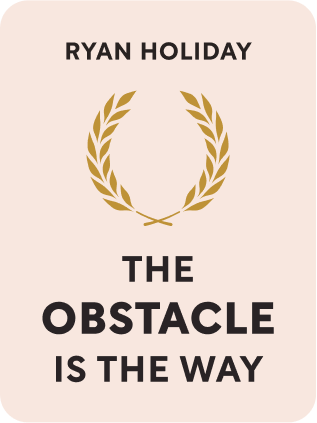

This article is an excerpt from the Shortform book guide to "The Obstacle Is The Way" by Ryan Holiday. Shortform has the world's best summaries and analyses of books you should be reading.
Like this article? Sign up for a free trial here .
Do you tend to overthink things when it’s time to take action towards your goals? How do you get over this action paralysis?
When faced with the need for action, we too often procrastinate and make excuses. But consistently putting in the effort is how you build the momentum necessary to reach your goals, and momentum is more important than anything else. If you don’t take action to achieve your goals, your risk becoming soft and complacent.
Here is why it’s important to take consistent action towards your goals and never stop moving forward.
Act, Don’t Think
When it comes to taking action towards achieving our goals, we often get stuck in action paralysis. On a good day, we may analyze the problem and even map out solutions, but in the end, we don’t do anything, paralyzed by uncertainty. In doing so, we ignore the fact that people succeed because they act frequently and consistently, not because they act perfectly.
When we take our time analyzing an obstacle, we tend to obsess over what it means to us instead of simply seeing it as it is. This makes obstacles seem bigger and more difficult to deal with than they truly are. Instead of overanalyzing what problems mean, take the first step toward solving them. For example, if you lose your job, you may get caught up in painful navel-gazing, trying to pinpoint everything you did wrong and fretting about what’ll happen to you in the future. Instead, Holiday would advise you to force yourself to live in the present and start looking for another job.
| The One Thing You Should Think About In The One Thing, Gary Keller, like Holiday, acknowledges the importance of consistent action to build momentum toward your goals over time. However, Keller emphasizes that this momentum must be focused in the right place for it to be worth your time. Holiday warns of the dangers of overthinking, but Keller would argue that if you act without first considering how to optimize your effort, underthinking can be just as harmful. Keller argues that even if you’re aggressively taking action to achieve your goals, you’re wasting your time if you’re not focusing on your “One Thing”—the task that will get you to your most ambitious goal faster than anything else. To find your One Thing, Keller suggests asking yourself “What one thing can I focus on that will have the greatest impact on my overall goal?” For example, if you want to start a restaurant, your One Thing may be to perfect your signature dish—this will make it easier for you to advertise, win over investors, and retain loyal customers in the future. Another reason to take the time to determine your One Thing is the psychological advantage this provides. Holiday warns that taking too much time analyzing your problem and what it means for you will make it seem more difficult to complete than it actually is. However, if you follow Keller’s advice, analyzing your problems may actually make them less intimidating, as the goal is to identify tasks and obstacles you can ignore completely. In Keller’s eyes, you have to do far less to succeed than people generally imagine. Paring your big goal down to the most essential task will give you the confidence to take action. |
When Tragedy Strikes, Act
Holiday asserts that in many cases, aggressive action is most effective in times when we’d least want to act: after an unexpected disaster sweeps us off our feet. When tragedy strikes, most people recoil, taking fewer risks and seeking to conserve whatever they have left. However, we would be better off keeping our eyes open for an opportunity within the tragedy, as the harshest tragedies sometimes carry the greatest gifts.
Tragedies take something from us that we would have wanted to keep or otherwise shake us out of our comfort zone. However, Holiday points out that by changing our circumstances so drastically, they inevitably reveal new choices we wouldn’t have been able to make before the crisis. To use an extreme example, if you’re the victim of identity theft and lose your life savings, the event may spur you to pursue your dream of selling your belongings and joining a monastery.
Furthermore, Holiday cites a psychological phenomenon called post-traumatic growth—evidence shows that people who persevere through pain and suffering are often positively transformed by the experience. They recognize their own strength and become more motivated to accomplish meaningful tasks. You can claim benefits like these by continuing to act in the face of tragedy.
| Why You Need Some Adversity In The Happiness Hypothesis, Jonathan Haidt devotes a chapter to the benefits of tragedy and examines the phenomenon of post-traumatic growth. Haidt goes into greater detail than Holiday about how enduring tragedy helps you develop a resilient character, and he even makes the case that some hardship is necessary for humans to reach their full potential. Haidt notes that trauma not only exposes survivors to new, often better opportunities (as Holiday establishes), but it also changes, and often improves, the values and priorities they use to evaluate those opportunities. When ripped from their comfort zones, trauma survivors realize that the things they used to find important—their career or material comforts—no longer matter to them. They spend time exploring alternative sources of happiness (for instance, loving relationships) and often settle on more reliable and sustainable sources of happiness than those they previously held. Additionally, Haidt explains that adversity serves as valuable material for the narrative you tell yourself about your life. If, thinking back, your life story serves as proof that you’re the kind of person who overcomes adversity for a noble cause, you’ll be more resilient and purposeful in the present. For this reason, a certain amount of adversity is healthy, especially in your late teens and early adulthood, when your self-narrative is first solidifying. |

———End of Preview———
Like what you just read? Read the rest of the world's best book summary and analysis of Ryan Holiday's "The Obstacle Is The Way" at Shortform .
Here's what you'll find in our full The Obstacle Is The Way summary :
- Why you should think of any obstacles as opportunities
- How Stoicism can show you the way to overcome challenges
- How Theodore Roosevelt's struggle with asthma prepared him for future struggles






